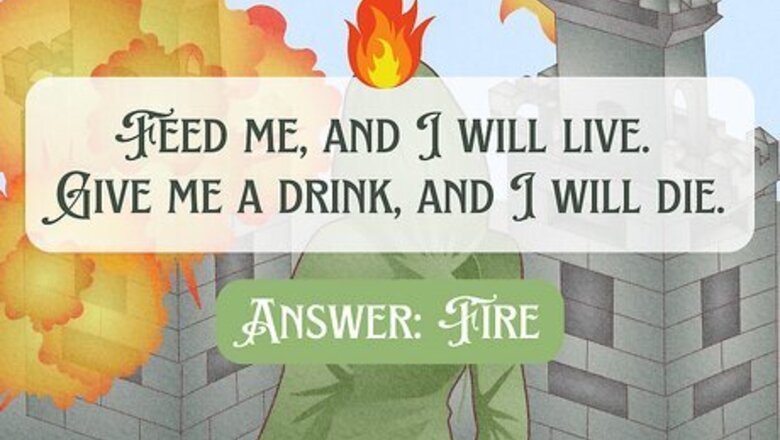
views
Simple D&D Riddles
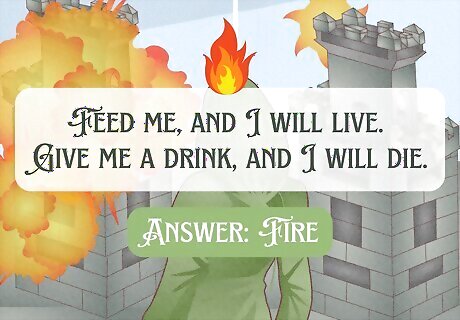
Feed me, and I will live. Give me a drink, and I will die. Answer: Fire Another riddle with “fire” as the answer is: What is not alive but grows, does not breathe but needs air? Any type of fire-themed area or monster would be perfect for this riddle. For example, if a player gives a wrong answer, maybe fire could shoot up from the floor or out of a secret mechanism and deal damage to the whole party.
If you drop me, I’m sure to crack. Smile at me, and I’ll always smile back. Answer: A mirror
What kind of room can you never enter? Answer: A mushroom
What falls but never breaks? What breaks but never falls? Answer: Night and day (nightfall and daybreak)
My life can be measured in hours; I only serve to be devoured. Slim, I am quick. Fat, I am slow. The wind is my foe. Answer: A candle
It has a golden head and golden tail—but it has no body. Answer: A gold coin You might let players find some treasure after answering this riddle correctly—or let them think there’s a treasure when it’s really an illusion or trap.
What holds water yet is full of holes? Answer: A sponge
It wears a leather coat to keep its innards in working order. It escorts you to other realms without a magic portal. Answer: A book
A father’s child, a mother’s child, yet no one’s son. Who am I? Answer: A daughter
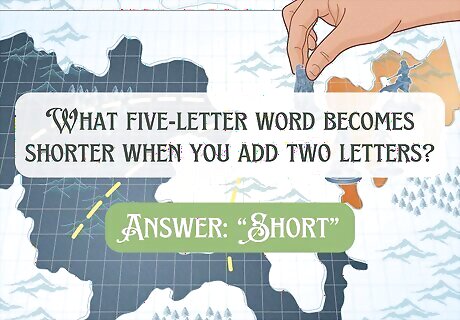
What five-letter word becomes shorter when you add two letters? Answer: “Short”
What binds two people yet touches only one? Answer: A wedding ring
What has two hands on its face but no arms? Answer: A clock
What has cities but no houses, forests but no trees, and water but no fish? Answer: A map You might reward players with a map they need to reach the next part of their quest after they answer this riddle—or force them to give up a map to answer it, making their journey more challenging.
Passed from parent to child and shared between siblings, though it is used more by others. Answer: A name Instead of saying “a name,” you might have players say their characters’ names aloud. This can be a sort of verbal trap; for example, a fey creature might use the riddle to learn the party’s names (and in D&D, one of the rules of the Feywild is never to give a fey creature your full name; it gives the fey power over you).
What kind of coat is always wet when you put it on? Answer: A coat of paint
What is something you keep when you need it not, but throw out when you do need it? Answer: An anchor
What is long, brown, and sticky? Answer: A stick
River bridge crossing, look out for the guards. Can you spell that without any R’s? Answer: T-H-A-T
Many have heard me, yet nobody has seen me. I won’t speak back unless spoken to. What am I? Answer: An echo
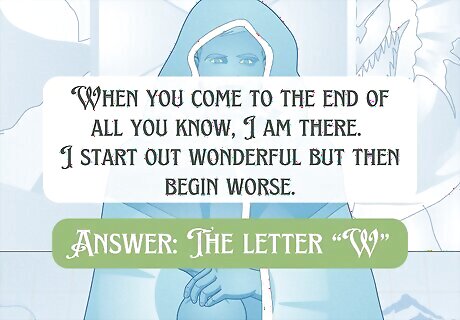
When you come to the end of all you know, I am there. I start out wonderful but then begin worse. Answer: The letter “W”
Twelve men walking by, twelve pears hanging high. Each took a pear and left eleven hanging there. How did it happen? Answer: “Each” is one of the men’s names
Two bodies in one; the longer I stand, the faster I run. Answer: An hourglass
What is so fragile that even speaking its name will break it? Answer: Silence You might use this riddle to signal players that there’s an area ahead in which they must be completely silent (or else they’ll be in danger).
You never see it, but it’s almost always there, and most people quickly notice when it’s absent. Answer: Oxygen (breathable air)
Brought to the table. Cut and served. Never eaten. Answer: Cards
We seize it from its home, tear apart its flesh, drink the sweet blood, then cast its skins aside. Answer: An orange
You keep it, but it never ages. Once shared, it is gone forever. Answer: A secret
What can be broken without even lifting a finger? Answer: A promise This kind of riddle (or the one above, which has a similar theme (since its answer is “secret”) could be used to subtly indicate duplicity, betrayal, or double-crossing; this could apply to something that already happened or something that will happen to the party soon.
What is black when you buy it, red when you use it, and white when you throw it away? Answer: Coal
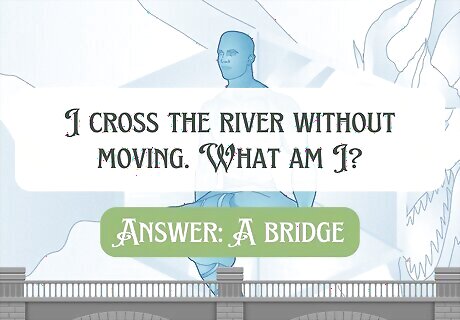
I cross the river without moving. What am I? Answer: A bridge After answering this riddle correctly, a bridge could appear that lets the party reach their destination! This could be a magical bridge that forms in a dungeon, somewhere in the wilderness, or even a bridge that leads to a different world.
A cloud is my mother, the wind is my father, my son is the cool stream, and my daughter is the fruit of the land. A rainbow is my bed; the earth is my final resting place. Answer: Rain
What lies down only when it dies? Answer: A tree Here’s a nature-themed riddle to incorporate into an adventure where your players have to explore a vast forest—or even just negotiate with a druid, ranger, or fey creature who really loves riddles!
As light as a feather, but you can’t hold it for ten minutes. Answer: Your breath
Lighter than what I am made of, more of me is hidden than is seen. Answer: Iceberg (or ice)
What goes round and round the wood but never goes into the wood? Answer: The bark of a tree
What grows up while growing down? Answer: A goose Not every riddle has to have a serious or ominous answer! This one may challenge players simply because “goose” is the last thing on their minds while playing D&D; it’s so simple that it’ll throw them for a loop.
What stands on one leg with its heart in its head? Answer: A cabbage
It’s been around for millions of years but is no more than a month old. What is it? Answer: The moon
Silver, brass, bronze, gold. Given, bought, stolen, sold. Symbols of wealth, power, or love. Forged like a sword, fits like a glove. Answer: Ring
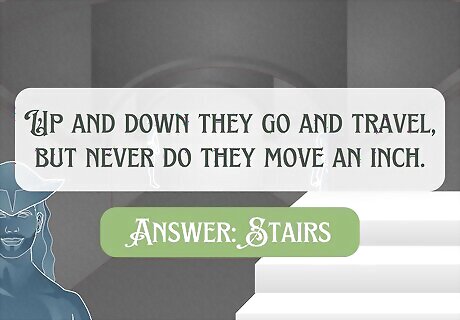
Up and down they go and travel, but never do they move an inch. Answer: Stairs
When is a door no longer a door? Answer: When it’s “ajar” This riddle is all about wordplay—and it’s on the easier side if you have players who tend to struggle with puzzles and riddles. Plus, it’s the perfect riddle to throw into a dungeon. For example, say there’s a magically locked door in a dungeon leading to the next area or an item the players need. The door could speak this riddle, and instead of unlocking the door, players have to guess the answer to proceed.
They are many and one, they wave and they drum, used to cover a stare, they go with you everywhere. Answer: Hands
Some are cherished, some are hated, and even if lost, they remain with you. Answer: Memories A correct answer might restore a forgotten memory to the character who answers; conversely, a character who answers wrong might get the “Modify Memory” spell cast on them (so you can give them a false memory or remove a memory entirely).
So simple that I can only point, yet I guide people all over the world. Answer: A compass
I go around in circles but always straight ahead; I never complain, no matter where I am led. Answer: A wheel
I am an eye set in a blue face. My gaze feeds the world. If I go blind, so does the world. Answer: The sun Try incorporating this riddle into a puzzle that involves sunlight. For example, you might create a puzzle in which players must use a network of mirrors to get a beam of sunlight from one place to another.
Turn us on our backs and open up our stomachs. You will be the wisest of people—though at the start a lummox. Answer: Books
A leathery snake with a stinging bite, I’ll stay coiled up unless I must fight. Answer: A whip
They call me the king. I have the eyes, hiss, and fangs of a snake, but no scales or venom. Answer: A cat
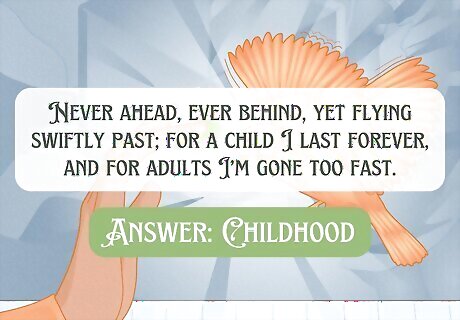
Never ahead, ever behind, yet flying swiftly past; for a child I last forever, and for adults I’m gone too fast. Answer: Childhood
Tricky D&D Riddles
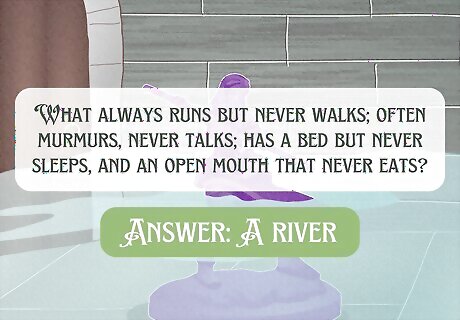
What always runs but never walks; often murmurs, never talks; has a bed but never sleeps, and an open mouth that never eats? Answer: A river An aquatic adventure is the perfect setting for this crafty riddle! Or, if you’re not running an aquatic adventure, you could still have a water-themed creature, like a water elemental or naiad (a fey river spirit), pose the riddle to players.
I don’t have eyes, but once I did see. I once had thoughts, now white and empty. Answer: A skull Consider using this riddle during an adventure associated with the undead in some way.
Never resting, never still, moving silently from hill to hill. It does not walk, run, or trot. All is cool where it is not. Answer: Sunshine
This world has four siblings, all born together. The first runs and never wearies. The second eats and is never full. The third drinks and is always thirsty. The fourth sings a song forever. Answer: Water, fire, earth, and wind A nature or elemental-themed area could be the perfect setting for this riddle!
It is the beginning of eternity, the end of time and space, the beginning of the end, and the end of every space. What is it? Answer: The letter “E”
Bright as diamonds, loud as thunder. Never still, a thing of wonder. Answer: A waterfall
This fire is smothered best not by water or sand, but by words. Answer: Desire Try posing this riddle during an adventure where you’re trying to tempt the party into doing something, or taking treasure they shouldn’t. You could even have a monster associated with desire speak the riddle, like a succubus or incubus.
Better old than young; the healthier it is, the smaller it will be. Answer: A wound
What is it that, given one, you’ll either have many or none? Answer: A choice
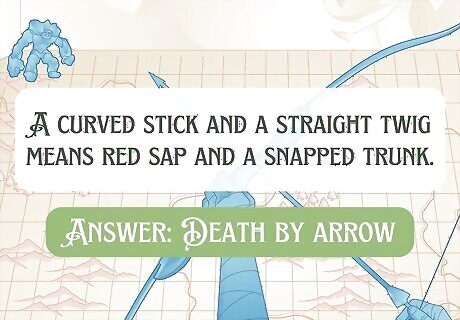
A curved stick and a straight twig means red sap and a snapped trunk. Answer: Death by arrow You may want to leave a subtle clue or two for this one. For example, maybe after a wrong answer, an arrow shoots out of a hidden trap at the character who answered wrong.
Walks in the wind, runs in the rain, makes dry oceans in the sun. Counts time, stops clocks, swallows kingdoms, gnaws rocks. Answer: Sand
The cost of making, only the maker knows. Valueless if bought but sometimes traded, a poor man may give one as easily as a king. When one is broken, pain and deceit are assured. Answer: A promise
What is something that dawns on you, even when it shouldn’t? Answer: The obvious
What tastes better than it smells? Answer: A tongue
I am born in fear, raised in truth, and come to my own in deed. When comes a time that I’m called forth, I come to serve the cause of need. Answer: Courage
The foolish man wastes me, the average man spends me, and the wise man invests me—yet all men succumb to me. What am I? Answer: Time
What has four legs in the morning, two legs in the afternoon, and three legs in the evening? Answer: A person (As a child, they crawl on all fours; when they’re an adult, they walk on two legs; when they’re elderly, they use a cane)
Forty white horses on a red hill. First, they champ, then they stamp, and then they stand still. Answer: Teeth This clever riddle comes from The Hobbit—it’s a riddle Bilbo poses to Gollum when they meet under the goblins’ lair.
I am what men love more than life and fear more than death or mortal strife; what dead men have and the rich require. I’m what contented men desire. Answer: Nothing
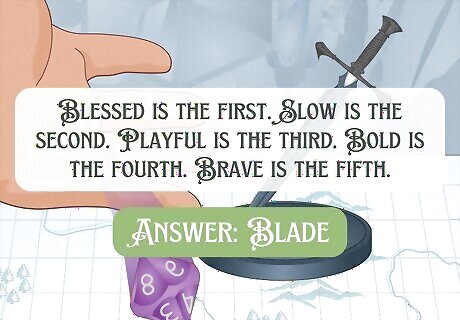
Blessed is the first. Slow is the second. Playful is the third. Bold is the fourth. Brave is the fifth. Answer: Blade
In the form of a fork or sheet, I hit the ground. And if you wait a heartbeat, you can hear my roaring sound. Answer: Lightning
What means everything to you but nothing to me? Answer: Your life This riddle is nothing short of ominous—so it’s the perfect thing to throw at players right before a fight with a particularly spiteful enemy.
No matter if parched, no matter if rolled, no matter if magic, no matter how old. Answer: Paper If you want to give the players a hint, serve up this riddle on a piece of paper; that way, you can subtly plant the clue in their minds.
What has six legs but only walks on four? Answer: A person riding a horse This riddle is tricky because, in the world of D&D, players might try to think of different six-legged creatures before arriving at the simpler answer of “a person on a horse.”
Alive without breath, as cold as death; never thirsty, ever drinking, all in mail never clinking. Answer: Fish
Runs smoother than any rhyme, loves to fall but cannot climb. Answer: Water
The more you leave behind, the more you take. Answer: Footsteps Because this riddle is pretty vague, you might want to incorporate a clue or two into it; for example, you might let players pass a Perception check to notice footprints in the area.
Three lives have I: gentle enough to soothe the skin, light enough to caress the sky, hard enough to crack rocks. Answer: Water
Weight in my belly, trees on my back, nails in my ribs, feet I do lack. Answer: Ship (or boat)
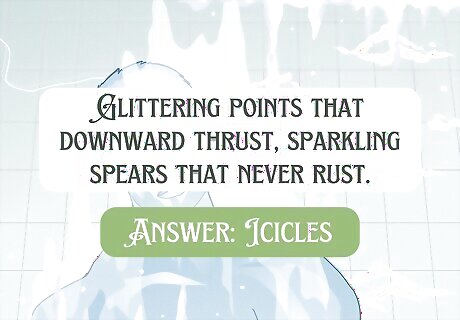
Glittering points that downward thrust, sparkling spears that never rust. Answer: Icicles
They arrive every night whether invited or not. They can be seen but not heard or touched. If one falls, the rest keep moving. Answer: The stars
Deep, deep do they grow, spreading out as they go. Never needing any air, they are sometimes as fine as hair. Answer: Roots
Halo of water, tongue of wood, skin of stone, and long I’ve stood. My fingers reach to the sky, and inside my heart, people live and die. Answer: A castle
Beware the red cave where the walls drip with ichor, where the floor isn’t made of stone, wood, or wicker. Beware the white gargoyles stuck fast in the roof; when the wind blows through, a smell most uncouth. And beware the tunnel at the back of the cave, for down at the bottom awaits a watery grave. Answer: A mouth
I shine brightest in the dark. I am there but cannot be seen. To have me costs you nothing. To be without me costs you everything. Answer: Hope
Time existed before me, but history can only begin after my creation. Answer: Writing You might use this riddle in a library, monastery, museum, or place of study; that way, the environment itself can be a clue!
When one does not know what it is, then it is something. When one knows what it is, then it is nothing. Answer: A riddle
If I’m in front, I don’t matter. If I’m in back, I make everything more. I am something yet I am nothing. What am I? Answer: Zero
A serpent swam in a silver urn. A golden bird did in its mouth abide. The serpent drank the water; this, in turn, killed the serpent. Then, the golden bird died. Answer: An oil lamp
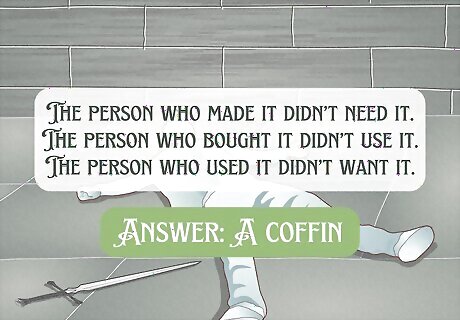
The person who made it didn’t need it. The person who bought it didn’t use it. The person who used it didn’t want it. Answer: A coffin
The more that is here, the less you will see. Answer: Darkness Instead of giving a verbal answer, players might have to get rid of every light source in the area—thus creating darkness. The riddle could also be a warning. For example, if there’s a beholder or medusa in the next area, the players might need a warning not to look at them.
You feel it but never see it—and never will. Answer: Your heart
Each morning, I appear to lie at your feet; all day, I follow no matter how fast you run, yet I nearly perish in the midday sun. Answer: A shadow
Pull with all your might, only a whistle you’ll gain. But almost out of sight, someone may shrink in pain. Answer: A bow and arrow
A box without hinges, key, or lid, yet golden treasure inside is hid. Answer: Eggs
Voiceless it cries, wingless it flutters, toothless bites, and mouthless mutters. Answer: Wind
I am gifted to you only when I am unwanted. I have the power to kill kings or the lowest paupers. My strength is unquestioned, and I move far and wide, yet my power can falter from potions that are imbibed. Answer: Disease
It can pierce the best armor and make swords crumble with a rub. Yet for all its power, it can’t harm a club. Answer: Rust
It can be said: to be gold is to be good; to be stone is to be nothing; to be glass is to be fragile; to be cold is to be cruel. Unmetaphored, what am I? Answer: A heart
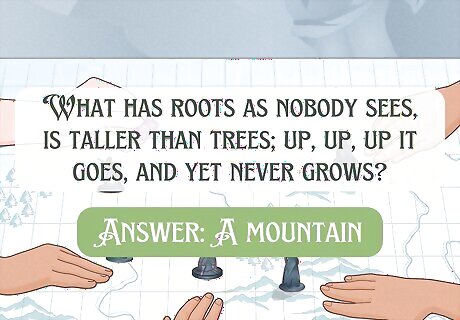
What has roots as nobody sees, is taller than trees; up, up, up it goes, and yet never grows? Answer: A mountain
How to Use Riddles in D&D
Incorporate riddles into dungeons and traps. A riddle can be tied to a trap or obstacle in your dungeon. For example, maybe the party must answer a riddle correctly to get through a door—but if they don’t, a trapdoor will open beneath their feet and cause them to fall! The obstacle in question can also directly tie into the riddle’s subject; that way, there’s a thematic pattern to the riddles and dungeon. For example, if you’re throwing your players into a dungeon inhabited by a mad druid, you might have them answer a series of nature-themed riddles. If the players are navigating an underwater prison or talking to the ruler of an underwater city, you might choose riddles with aquatic-themed answers.
Create a game of riddles instead of a guaranteed battle. You can have potential enemies challenge the party to a game of riddles and offer something they want in exchange for their success (but if the party answers a riddle wrong, that enemy might attack). This can be a great alternative to a battle in a more roleplay-focused adventure or if you have other battles planned for that session and don’t want to overdo it. For example, say there’s a sphinx guarding something the party needs for an important quest. The sphinx might offer to give them what they want if they can answer its riddles!
Limit the amount of times players can answer a riddle. This can add some stakes to the game. If players have as long as they want to shout out any answer that pops into their heads, they might not take the riddle as seriously. That doesn’t mean you need to time them—but you might give them a specific number of times they can answer before their time runs out. For example, say you give the party three guesses. The statue giving the riddle will let them pass if they guess the riddle’s answer correctly. If they use all three and the third guess is still wrong, the statue will attack them.
Have players figure out the riddle in character. There’s nothing wrong with players working together to come up with the answer—but to prevent metagaming (using knowledge their characters wouldn’t have to influence the game), ask players to have their discussions in character. That way, it’ll feel like their characters are working together and hopefully inspire more roleplaying in the future.
Grand rewards for correct answers. The more complex the riddle, the better the reward should be! Riddles can be just as tricky as a battle in D&D—they’re just difficult in a different way. So, reward your players for the thought and care they put into a game of riddles. The reward could be loot (treasure) or something else: new information, a new ally, or a side quest to explore, for example.
Making Your Own D&D Riddles
Start with the answer and work backward from there. The trick to making a riddle for your D&D game is knowing what you want the subject of the riddle to be. Then, you can brainstorm and find creative ways to describe that answer—and turn those into a complete riddle. For example, try using: Abstraction. Break the subject down into the most straightforward concepts possible. Metaphors. Use a metaphor (or simile) to describe the riddle’s subject. Vague descriptors. Describe a particular aspect of the subject in a way that isn’t totally obvious. Extra hints. Provide one or two details to point problem-solvers in the right direction, if necessary. For example, say your subject (and answer) is a pillow. Using abstraction, we might say it’s a soft comfort item for sleeping on. Then, we might use a metaphor and say it’s “a downy cloud.” A complete riddle might be: “A downy cloud, close enough to touch, but only with your head.”




















Comments
0 comment